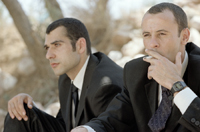

 | 
| |
| Home | Profile | Search | Help | Logout | Film Archives | Feature Archives | |||
| 2005 NYFF Films Introduction Good Night, and Good Luck Regular Lovers The Death of Mr. Lazarescu Methadonia L'Enfant (The Child) Bubble The Squid and the Whale I Am Capote Something Like Happiness Sympathy for Lady Vengeance Manderlay Tale of Cinema Breakfast on Pluto Through the Forest The President's Last Bang Who's Camus Anyway? Three Times Paradise Now Tristram Shandy Gabrielle The Sun The Passenger Cache (Hidden) | Paradise
Now Hany Abu-Assad, Netherlands / Germany / France, 2005, 90 min.  Paradise Now was produced under extremely dangerous conditions. You might compare it with Barbet Schroeder's 2000 Our Lady of the Assassins/La Virgen de los sicarios, but the filmmakers this time have arguably a considerably greater personal involvement in the material. They -- Abu-Assad -- wanted to make it as "authentic" as possible and they have achieved their goal. It's interesting to see this in the light of Elia Suleiman's gentle ironic films. Is this the same world? It is (and evidently Abu-Assad has done some gently ironic films himself). But the main characters of Paradise Now are from a different world. They grew up in Nablus refugee camps with a sense of desperation. They see themselves as living in a large prison. They've committed to being suicide bombers, martyrs to the Palestinian cause. They request to be sent out together. The focus is more on Said. When they're told their mission comes tomorrow, he and Khaled relax together, then Said spends the evening with his family, especially his good-looking mother. He goes to see Suha (whom he's recently met working on her car) at 3 a.m. He expects to die within 24 hours, but can't tell anybody. He and Khaled do their martyr videotapes -- a semi-comic ritual, because the recorder doesn't work at first, and they they are shaved and washed and barbered, explosives are strapped on them, and they're dressed in dark suits to look like settlers on the way to a wedding. The martyr videotape sequence is comic, but the director has explained that this was done where real martyr videos are recorded and with the Palestinian group's real gun, and the actors were plenty scared. Land mines, rockets, and threats from both sides assaulted the film crew. People were killed nearby and one specialist was seized and some of the European crew members left. Finally they couldn't shoot in Nablus any more and continued in Nazareth, Abu-Assad's home town. When the two men cross the Nablus border there's a cop car and they bolt. Said disappears, and their handlers suspect he's a collaborator. Khaled vouches for him and they let him go looking for Said. Said has a very rough time because he's running around looking for Khaled but doesn't know how to take his explosives off. The next day they are reunited. Said has convinced the leader he's committed, and they're sent out again, but they start arguing about whether this is right to do or not. I won't say how it turns out, but the second half is filled with both a terrible commitment and a terrible doubt. I don't know if this film will influence anybody one way or the other but for authenticity this is hard to beat. These actors embody their characters to an exceptional degree, and this is a combination of good casting (especially of the two young men) and using the actual locations. Paradise Now was shot not on digital video but film and with a wide aspect ratio, which adds beauty and intensity to it. DV is just a fake-vérité effect now. Real life isn't grainy; it's clear. Once again this was a New York Festival selection that represented unquestionably good, intense, vivid film-making. (Chris Knipp) |
|